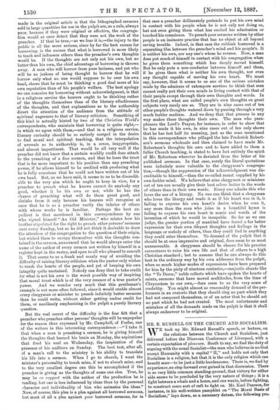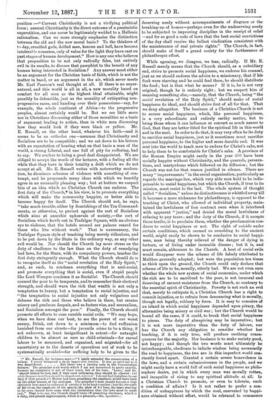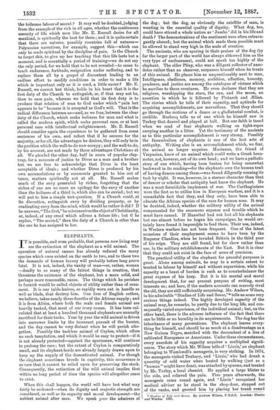MR. E. RUSSELL ON THE CHURCH AND SOCIALISM.
WE took up Mr. Edward Russell's speech, or lecture, on the relations between the Church and Socialism, just delivered before the Diocesan Conference of Liverpool, with a certain expectation of pleasure. Sooth to say, we find the duty of arguing with the usual Socialist—the man who believes in no God except Humanity with a capital "H," and holds not only that Socialism is a religion, but that it is the only religion which can benefit man—to be just a little burdensome. There is, we find by experience, no step forward ever gained in that discussion. There is so very little common standing-ground, that victory for either side seems to be precluded by the very nature of things ; it is a fight between a whale and a horse, and one wants, before fighting, to construct some sort of raft to fight on. Mr. Karl Pearson, for instance, in his well-written pamphlet on "The Moral Basis of Socialism," lays down, as a necessary datum, the following pro. position :—" Current Christianity is not a vivifying political force; current Christianity is the direct outcome of a pessimistic superstition, and can never be legitimately wedded to a Hellenic rationalism. Can we more strongly emphasise the distinction between the old and the new moral basis ? To the thinkers of to-day, crucified gods, deified men, heaven and hell, have become intolerable nonsense, only of value for the light they have cast on past stages of human development." How is any one who believes that proposition to be not only radically false, but entirely evil in its results, to discuss that pamphlet to the benefit of any human being interested in Socialism P Any answer must either be an argument for the Christian basis of faith, which is not the matter in hand, or an argument in the air, which never meets Mr. Karl Pearson's real thought at all. If there is no super- natural, and this world is all in all, a new morality based on comfort for all men as the highest ideal attainable, might possibly be defensible, just as the morality of extirpating non- progressive races, and handing over their possessions—say, for example, the whole continent of Africa—to the progressive peoples, almost certainly would be. But we see little more lase in Christians discussing either of those moralities as a basis of argument leading to action, than in white men discussing how they would look if they were black or yellow. Mr. E. Russell, on the other band, whatever his faith—and it seems to be an orthodox one—assumes that Christianity and Socialism are to be compatible ; and we sat down to his lecture with an expectation of bearing what on that basis a man of the world, a strong Liberal, and one full of pity for suffering, had to say. We confess to being a good deal disappointed. We are obliged to accept the words of the lecturer, with a feeling all the while that they have in their totality a drift which we do not accept at all. Mr. E. Russell writes with noteworthy modera- tion, he dismisses schemes of violence with something of con- tempt, and he propounds many ideas with which we heartily agree in an unusually pleasing way ; but at bottom we suspect him of an idea which no Christian Church can endorse. The first duty of the Church,* in his view, is to promote everything which will make the community happier, or better able to become happy for itself. The Church should not, he says, "take much trouble, either by fiourishings of the Ten Command- ments, or otherwise, to prot.est against the sort of Socialism which aims at anarchic upheavals of society,—the sort of Socialism which bawls out in Trafalgar Square, with an obvious eye to violence, that the hotels around are palaces reared for those who live without work." That is unnecessary, the Trafalgar Square style of teaching being merely ridiculous, and to be put down by the State in the ordinary way, as any other evil would be. Nor should the Church lay more stress on the duty of obedience to the law than on the duty of remedying bad laws, for the State, with its compulsory powers, teaches the first duty stringently enough. What the Church should do is to recognise itself as the "social revelation of the Holy Spirit," and, as such, to condemn everything that is anti-social, and promote everything that is social, even if stupid people like Lord Wemyes condemn it as Socialist. The Church should counsel the poor to be temperate, and to remember their electoral strength, and should warn the rich that wealth is not only a temptation to luxury, but a temptation to social injustice, and "the temptation to social injustice not only vulgarises and debases the rich and those who believe in them, bat creates misery and produces despair, and so fosters vice, and sensualism, and Socialism amongst the poor." Finally, the Church should promote all efforts to cure curable social evils. "We may hope, when we have done our best, to see the power of our worst enemy, Drink, cut down to a minimum—to find ruffianism banished from our streets—for juvenile crime to be a thing, if not unknown, at least insignificant in extent—for untaught children to be almost as rare as child-criminals—for casual labour to be measured, and organised, and migrated—for all uncertainty as to the deserts of operatives out of work to be systematically, avoided—for sufficing help to be given to the
[. Mr. Russell, for instance, says lately attended the consecration of a
bishop. I never witnessed a more impretsive service. It was as spiritual as it was magnificent. . . . . . Bat there was a jarring note in the Consecration Sermon. The preacher wed words which I are not concerned to quote exactly, because my complaint is not of their tenor, but of his tone. • Laws,' mid he, 'should indeed be just, and if they need reforming, they should be shored; tel while they are hues they should be obeyed and enforced I do Pot feel it profane to say that if that preacher s Master had been preaching the emphasis would have been oaths other branch of the sentence. The preacher's tone should reeoguive that obviously laws must be enforced if society is to be kept together ; bat the strength of his roan, the emphasis of his speech. the glow of his f see, the tears starting to his eyes, should have come with the declaration that the laws must be made just." That is to say, the Church Should leave off preaching obedience, which is a duty, and preach improvement, which is a pleasare.—En. Spectator.
deserving needy without accompaniments of disgrace or the breaking-up of homes—perhaps even for the undeserving needy to be subjected to improving discipline in the receipt of relief —and for so good a code of laws that the best social convictions of the day shall receive the fullest vindication consistent with the maintenance of real private rights." The Church, in fact, should make of itself a grand society for the furtherance of philanthropic effort.
While agreeing, we disagree, we fear, radically. If Mr. E. Russell merely means that the Church should, as a subsidiary end, strive to promote social happiness, we endorse his counsel, just as we should endorse the advice to a missionary, that if his flock were starving and he could feed them, he should distribute the food ; but is that what he means? If it is, he is not very original, though he is entirely right ; but we suspect him of meaning something else,—namely, that the Church, being "the social revelation of the Holy Spirit," should make of social happiness its ideal, and should strive first of all for that. That we deny altogether. The business of a Christian Church is not to secure social happiness, which, like personal happiness, is a very subordinate and entirely earthy matter, but to bring those whom it can influence or convert so much nearer to God, that they are better fitted for the spiritual life in this world and in the next. In order to do that, it may very often be its duty to sacrifice social happiness, just as it sometimes must sacrifice personal happiness, to the higher and more durable end. It was sent into the world to teach men to endure for Christ's sake, not to help them to be comfortable for Christ's sake. A province of the Roman Empire might easily in the year 200 have been socially happier without Christianity, and the quarrels, persecu- tions, and martyrdoms which followed on its diffusion ; but the Church was not for that reason justified in silence. There are many" improvements" in the social organisation, particularly as regards the marriage-law, which very able men hold to be indis- pensable to social happiness, bat which the Church, if true to its mission, must resist to the last. The whole system of thought called "Socialism," unless its distinctiveness is whittled away till it becomes a mere nickname for philanthropy, is opposed to the teaching of Christ, who allowed of individual property, main- tained the lawfulness of free contract even when it interfered with apparent "justice," and denied the moral lawfulness of refusing to pay taxes ; and the duty of the Church, if it accepts- those truths, is to proclaim them, whether the proclamation con- duces to social happiness or not. The right of suicide under certain conditions, which seemed so ennobling to the ancient world, might easily be shown to be conducive to social happi- ness, man being thereby relieved of the danger of dying in torture, or of living under incurable disease ; but it is, and must remain, abhorrent to the Church. A host of social evils would disappear were the scheme of life falsely attributed to Malthus generally adopted; but were the population ten times as thick upon the ground, the Church could only declare that scheme of life to be, morally, utterly bad. We are not even sure whether the whole new system of social economics, under which the rich are to be sacrificed to the poor, is not immoral and deserving of earnest resistance from the Church, as contrary to the essential spirit of Christianity. Poverty is not such an evil that, merely to extirpate it, a Christian Church has a right to commit injustice, or to refrain from denouncing what is morally, though not legally, robbery by force. It is easy to conceive of an island in which social happiness depended upon piracy, the alternative being misery or civil war ; but the Church would be bound all the same, if it could, to break that social happiness to pieces. The duty of almsgiving may be imperative; but it is not more imperative than the duty of labour, nor has the Church any obligation to consider whether her teaching, if it is only true, will produce soothing conee- quences for the majority. Her business is to make society good,. not happy ; and though the two words must ultimately be interchangeable, obedience to infinite wisdom being necessarily the road to happiness, the two are in this imperfect world con- stantly found apart. Granted a certain severe benevolence in the laws, and a certain submissiveness in the people, and we might easily have a world full of such social happiness as philo- sophers desire, yet in which every man was morally rotten, and incapable of rising to any spiritual altitude at all. Is a Christian Church to promote, or even to tolerate, such a condition of affairs P Is it not rather to prefer a con- dition of unhappiness by which the soul, enervated by happi- ness obtained without effort, would be rebraced to commence
the toilsome labour of ascent ? It may well be doubted,judging from the example of the rich in all ages, whether the continuous amenity of life which men like Mr. E. Russell desire for all mankind, is spiritually the best for them ; and it is quite certain that there are natures, possibly countries full of natures— Polynesian narratives, for example, suggest this—which can only be made spiritual by the discipline of pain. Is the Church to forget this, to give up her teaching that this life lasts but a moment, and is essentially a period of training—we do not say the only period, for we hold that to be not revealed—to cease to teach endurance, fortitude, resignation under suffering, sad to replace them all by a gospel of discontent leading to an endless effort to modify conditions in order to make a life which is important only as it is used, a little easier ? Mr. E. Russell, we cannot but think, holds in his heart that it is the first duty of the Church to extinguish, or, if that may not be, then to ease pain, whereas we hold that its first duty is to produce that relation of man to God under which "pain but appears to be " because it is accepted as God's will. That is the radical difference between us—and, as we fear, between the clear duty of the Church, which seeks holiness for man and what is called the modern spirit, which seeks personal ease, or at best personal ease with intellectual enlightenment. Mr. E. Russell should consider again the experience to be gathered from some sentences of his own, and reflect that if he secures for the majority, or for all, the advantages he desires, they will only be in the position which the well-to-do now occupy; and the well-to-do, by his account, are not made by those advantages Christians at all. We pleaded the other day, half in scorn of popular clap- trap, for a measure of justice to Dives as a man and a brother but we are free to acknowledge that Dives is the least acceptable of ideals ; and whether Dives is produced by his -own accumulations or by easements granted to him out of taxes, matters spiritually not at all. Mr. Russell makes much of the envy generated by riches, forgetting that the riches of one are no more an apology for the envy of another than the holiness of a third is, which also can be envied ; but we will put to him a simple test-question. If a Church could, at its discretion, extinguish envy by dividing property, or by eradicating envy from the mind, which would he rather it did ? If he answers, "The first," he misconceives the object of Christianity, or, indeed, of any creed which affirms a future life ; but if he replies, "The second," then the duty of a Church is other than the one he has assigned to her.


































 Previous page
Previous page